End Rohingya restrictions
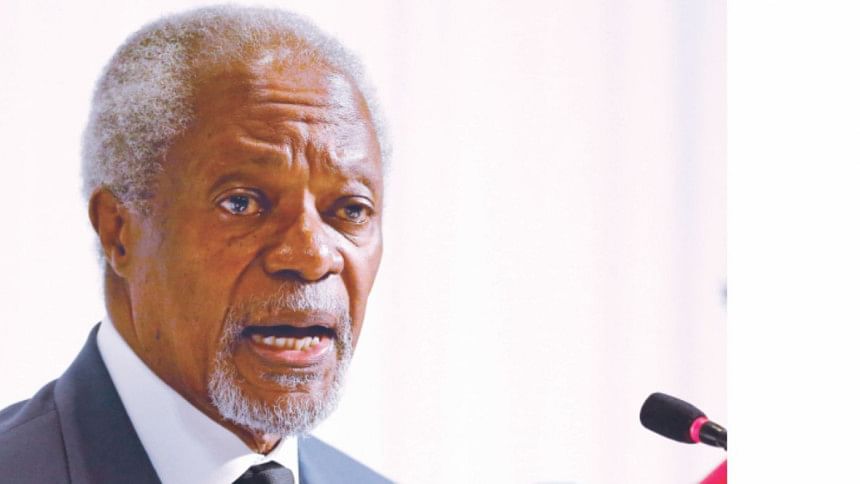
The Rakhine Advisory Commission, led by its chairman former UN chief Kofi Annan, has called for freedom of movement for all people in the Myanmar state of Rakhine and a review of the controversial 1982 citizenship law.
It has suggested bringing the law into line with international standards and abolishing “distinctions between different types of citizens”. The law, which effectively bars Rohingyas from becoming citizens, currently recognises full, associate and naturalised citizens.
The commission, which was formed by State Counsellor Daw Aung San Suu Kyi in September last year, made the recommendations in its 63-page report titled “Towards a peaceful, fair and prosperous future for the people of Rakhine”.
Annan on Wednesday presented the report to President U Htin Kyaw in Nay Pyi Taw.
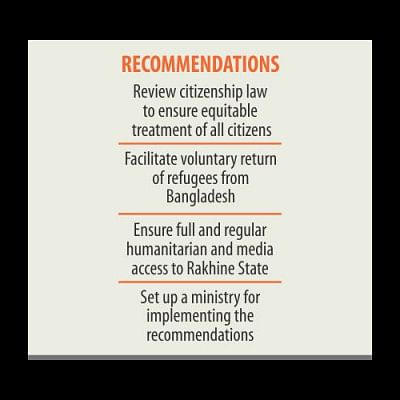
The report said scrapping restrictions on movement in Rakhine and granting citizenship to its Muslim minority people could help avoid fuelling extremism and bring peace to the state.
An estimated 1.1 million Muslims, including many Rohingyas, are denied access to citizenship under the citizenship law, which was enacted by former dictator U Ne Win. The law doesn't recognise Rohingya as one of the country's 135 ethnic groups.
Some rights groups hailed the report as a milestone for the persecuted Rohingya community because the Myanmar government had previously pledged to abide by the findings of the commission.
The report suggested that the government should maintain a strong bilateral relationship with Bangladesh to address the challenges in Rakhine.
“Events in one country have a profound effect on the other, as demonstrated by the thousands of Muslims from Rakhine State who sought refuge in Bangladesh after the violence in late 2016.
“There are profound developmental and humanitarian needs on both sides of the border, but also opportunities for cooperation that would benefit both countries,” said the report.
Security deteriorated sharply in Rakhine on the border with Bangladesh on October 9 last year when “militants” killed nine policemen in attacks on border posts.
In response, the Myanmar military sent troops fanning out into Rohingya villages in an offensive beset by allegations of arson, killing and rape by the security forces. Some 87,000 Rohingyas fled the violence into Bangladesh.
Bangladesh has been hosting 300,000 to 500,000 Rohingyas for over three decades. Around 30,000 more registered Rohingya refugees have been living in two camps in Cox's Bazar.
According to the commission report, the governments of Myanmar and Bangladesh should facilitate the voluntary return of refugees to Myanmar through joint verification, in accordance with international standards and with assistance from international partners.
“When refugees from Rakhine State would return from Bangladesh, the government of Myanmar should help create a secure environment and, where necessary, assist with shelter construction for those whose homes have been destroyed,” it said.
Welcoming the intention of the Myanmar government to set up a joint commission with Bangladesh, the report said the two governments could actively encourage more exchanges between civil society members, think tanks, academics and the private sector to promote mutual understanding and cooperation.
RISK OF RADICALISATION
The Rakhine commission warned that failure to implement its recommendations could lead to more extremism and violence.
“Unless current challenges are addressed promptly, further radicalisation within both communities is a real risk,” the report said, describing the Rohingya as the single biggest stateless community in the world.
If the legitimate grievances of local populations were ignored, they would become more vulnerable to recruitment by extremists, observed the commission.
The report acknowledged the recent government efforts to improve freedom of movement, but said it only affected those holding the “correct identification”.
“To have greater impact, freedom of movement should be delinked from the citizenship verification process, meaning that all individuals in Rakhine State should be able to move freely irrespective of whether they hold an NVC [National Verification Card], NRC [National Registration Card] or citizenship documentation, consistent with the basic rights of all people to free movement,” the report said.
An estimated 120,000 Muslims are confined to IDP (internally displaced people) camps in Rakhine, many without access to basic rights such as education and healthcare.
The commission said efforts to allow people return home has “shown little progress”. It called upon the Myanmar government to develop a “comprehensive strategy” towards closing all IDP camps.
The strategy should be developed through consultations with affected communities and should have clear timelines, the report said, adding all returns and relocations must be voluntary and should allow people to return to their place of origin as a priority, added the report.
In the interim period, it suggested improving shelter, water, sanitation and livelihoods in the IDP camps.
Humanitarian and media access to Rakhine has largely been cut off since the October attacks, and the commission urged the government to ensure full and regular access to all parts of the state.
The military has been accused of using disproportionate force in its operations, including allegations of mass rape, extrajudicial killing and torture. The government and military have continuously refuted the allegations.
In March, the UN Human Rights Council passed a resolution to form an investigation team to probe rights abuses in Myanmar, with a particular focus on Rakhine. However, the Myanmar government denied visas to its members.
The Rakhine commission further called for an “independent and impartial investigation” into the facts on the ground in order to ensure that those who conducted violations were held accountable.
The commission urged the government to form a ministry tasked solely with implementing its recommendations.
“The secretariat's staff should be in permanent consultation with groups in Rakhine State in the implementation of its work,” it added.
State-run Global New Light of Myanmar said the president hoped the international community would “understand the challenges and situation being faced by the government” in dealing with the Rakhine issue.

 For all latest news, follow The Daily Star's Google News channel.
For all latest news, follow The Daily Star's Google News channel. 

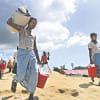
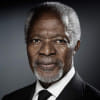
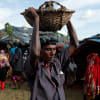
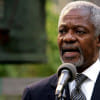



Comments